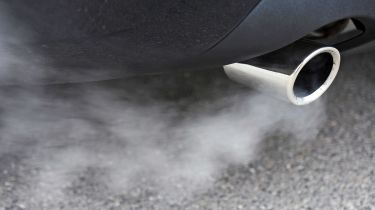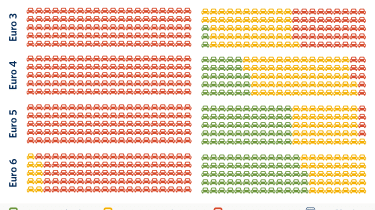New “impossible to cheat” emissions rating system launches
TRUE initiative system measures NOx emissions in real-world driving with light beam; auto industry hits out at "misleading" study

A new emissions measurement system that accurately measures and tracks real-world exhaust emissions of nitrogen oxide (NOx) has compiled emission records from 750,000 vehicles in Europe over the last decade.
Researchers from the FIA Foundation and the International Council on Clean Transportation (ICCT) have now released their findings from the last decade.
Dubbed The Real Urban Emissions initiative, or TRUE for short, the research includes data from Euro 3, 4, 5 and 6 vehicles – essentially cars made since the year 2000.
• Euro 6 emissions standards: what do they mean for you?
The initiative places vehicles into three groups based on their NOx emissions.
• Green: for vehicles with average NOx emissions that stay below 90 mg/km (milligram per kilometre) over a wide range of driving conditions.• Yellow: vehicles with average NOx emissions between 90 and 180 mg/km over a wide range of driving conditions.• Red: vehicles with average NOx emissions that stay above 180 mg/km over a wide range of driving conditions.
For comparison, Euro 3 limits (applicable for cars sold from 2000 to 2005) allowed petrol cars to emit 150mg/km of NOx, and diesels to emit 500mg/km. Euro 6 limits reduce those levels to 60 and 80mg/km for petrol and diesel cars respectively.

Credit: ICCT
Results from the TRUE assessments show all Euro 3 to Euro 5 diesels were given a Red rating. Only around one in 10 Euro 6 diesels were given a Yellow rating, and none received a Green grade.
Petrol cars fared far better, partly as the TRUE system only measures NOx emissions, rather than CO2 levels. While only 3 per cent of Euro 3 petrols received a Green rating, almost two thirds of Euro 6 cars were given the top grade, and none received a Red score.
The TRUE initiative has come in for criticism from the automotive industry, however, as its 2017 cut-off point means it did not assess cars built to the latest Euro 6d-Temp emissions standards.
• Carmakers to face emissions cheating fines of £50,000 per car in the UK
Erik Jonnaert from the European Automobile Manufacturers' Association (ACEA) said: "The claims from the new 'TRUE' study are misleading for consumers", adding: “As all cars tested as part of this TRUE Initiative were pre-Euro 6d vehicles, the fact that they do not meet emissions requirements that only became mandatory after they were put on the market is not surprising.”
Jonnaert said EU policy makers will be “disappointed” that the study makes “no acknowledgement that the latest Euro 6 diesel cars complying with the new RDE legislation are very clean."
The TRUE system assessed emissions by two methods. One involved using a portable emissions measurement system (PEMS) attached to the back of a car, while the other assessment method uses light beams to scan vehicles’ exhausts.
The TRUE initiative has been devised to “supply cities with data regarding the real-world emissions of vehicle fleets” providing the “technical information that can be used for strategic decision making”.
These scanned measurements are then linked to vehicles’ identities via automatic number plate recognition (ANPR) cameras, allowing researchers to build up an accurate picture of real-world emissions based on individual models of car.
The system’s developers say the TRUE initiative is “difficult if not impossible to defeat” because “it does not rely on a test with predefined driving cycles and test conditions and is not dependent only on results from RDE (real driving emissions) testing performed with PEMS equipment”.
Nitrogen oxide, or NOx emissions, have been linked to a number of health conditions and blamed for countless deaths. A recent study commissioned by environmental charity Global Action plan estimates the average diesel car in London causes £16,400 in health costs over its lifetime, with pollution from all cars and vans costing the economy £5.9 billion each year, and bringing about 10,000 early deaths.
Not sure what the future of diesel will be? Then read our explain-all article here.
Find a car with the experts




